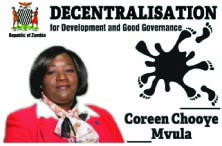 The National Decentralisation Policy emphasises the importance of community participation in the development process. The main aim of decentralisation also emanates from the need for the citizenry to exercise control over its local affairs and to foster meaningful development.
The National Decentralisation Policy emphasises the importance of community participation in the development process. The main aim of decentralisation also emanates from the need for the citizenry to exercise control over its local affairs and to foster meaningful development.
One of the key objectives of the National Decentralisation Policy is to empower provinces, districts and communities in order to achieve effective social economic development. The Decentralisation Policy, if well implemented, will promote peoples’ participation in democratic governance at the local level to enhance local governance. The Government has therefore invested a lot of resources (time, financial, human resource etc) in order to promote a bottom-up decentralised planning system.
Key steps have already been undertaken by the Government to realise this objective. This is evident from the work undertaken by the Decentralisation Secretariat to develop Guidelines on the establishment, management and operation of Ward Development Committees (WDCs).
These guidelines are yet another significant demonstration of government’s commitment towards the full implementation of the National Decentralisation Policy. The guidelines are meant to provide the conceptual framework of engagement and interaction between the various development agencies and stakeholders at sub-district level. As provided in the Decentralisation Policy and the guidelines, the council is responsible for the process of establishing the WDCs.
The development of these guidelines was followed by the nationwide capacity development process where staff in councils responsible for the planning function were inducted on the step-by-step process of creating WDCs.
In the recent past, the Secretary to Cabinet directed the Ministry of Local Government and Housing to ensure that councils prioritise the process of creating WDCs. This directive was not only timely but was also very clear and every local authority ought to respond accordingly.As the parent ministry, the Ministry of Local Government and Housing was directed to assume overall responsibility for the creation of WDCs, the sub structures prescribed in the Constitution and to take measures to ensure that all Councils form the WDCs not later than three months after the next general election i.e., November 2016. This directive is a wakeup call to all councils to ensure that community participation is promoted through formation of WDCs. The creation of WDCs under decentralisation may be one of the key performance indicators for chief and controlling officers and should therefore be taken with the seriousness that it deserves.
However, findings by Cabinet Office during the various monitoring missions to councils reveal that most of the councils have not prioritised the process of creation WDCs. A number of reasons have been given for this delay and these range from lack of resources to lack of knowledge regarding the entire process.
This article is a summary of the key major steps to be taken by each council to create WDCs, which is now a Constitutional requirement.
The first step in creating WDCs is the adoption of the programme and budget for WDCs by Council. This is done in the capacity of the council as a policy-making organ of the district.
The adoption of the program and budget is followed by sensitisation. Councilors should first and foremost be sufficiently sensitised on the necessity of the WDCs, the conceptual approach leading to their formation as well as their implication to the whole development process of the Wards and the District. The sensitisation of Councilors is to be conducted in form of workshops by the councils.
What follows then are community sensitisation meetings which are to be conducted in each zone focusing on the benefits, functions and process of electing representatives to the WDCs. In mobilising communities for sensitization meetings, the council will endeavor to use key community based persons and institutions like Traditional Authorities, Ward Councilors as civic leaders, teachers, pastors, schools and churches.
The registration of voters for WDC elections is another step and this takes place at least three months before the zonal elections. The council publicises the exercise providing details on who qualifies to be registered as a voter, the venues, duration and time for registration. In this process, residents are allowed to verify their details after a draft Voters Register is produced. After verification, the Council will approve the Zonal Voters’ Register.
Once this has been done, councils now conduct elections to usher into office WDC members. It is the responsibility of the Council to conduct elections including registration of voters, provision of logistics and setting the date for elections.
Other steps such as orientation of elected WDC members, appointment of ex-officios and selection of WDC executive committee members are all done after the voting process and these details are available in the guidelines on the establishment of WDCs. These guidelines are a detailed document that was developed by the Decentralisation Secretariat (DS) through a national consultative process dating back to 2011/2012. Each council has a copy of these Guidelines that were used during the training and orientation meetings undertaken for all councils in 2012. There is need therefore for councils to prioritise the creation of WDCs as this is a constitutional requirement.
Stakeholders should note that the establishment of WDCs is a consistent and coherent process that requires uniformity. Further, these structures require that all stakeholders in the development process recognize WDCs as structures through which development efforts should be coordinated at the sub-district level. Councils have already been empowered with this information which they should use accordingly.
The Author is:
Assistant Director (Communications)
Decentralisation Secretariat Cabinet Office
Tel: 0211-226787
email: coreencm2003@yahoo.com






